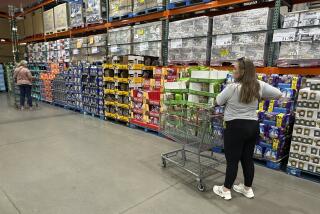Consumer Spending Falls 1st Time in 7 Months : Indicators: Factory orders also slump. Personal income rose, due mostly to huge farm subsidy payments.
- Share via
WASHINGTON — Consumer spending fell in March for the first time in seven months, and orders to factories slumped too, the government said Friday. Personal income rose, but mostly because of huge farm subsidy payments.
Personal consumption spending declined 0.2%, to a seasonally adjusted annual rate of $4.23 trillion, the Commerce Department said.
Incomes jumped 0.6%, to an annual rate of $5.26 trillion, but that was bolstered by the largest monthly farm subsidy payment in nearly six years.
“We are basically just mired in a slow-growth economy,” said economist Lawrence Chimerine, an adviser to DRI-McGraw Hill, a Lexington, Mass., forecasting firm.
The department said new orders to factories dropped 1.5%, the worst decline since August.
Orders for durable goods--big-ticket items from cars to computers--plunged 3.4%, the biggest decline since December, 1991. Orders for non-durable goods, such as food products, clothing and paper, rose 0.7%. Much of the decline came in aircraft orders, but even excluding transportation, orders edged down 0.1%.
The most-watched component of income, wages and salaries, increased a scant 0.1% after falling 0.2% a month earlier.
Clinton Administration officials have used the gloomy numbers to argue for revival of their jobs stimulus package. Republicans have countered that fear of new taxes is discouraging consumers and business executives.
But economists say Friday’s reports show the main source of consumers’ unease--lack of income growth.
“When we say we can’t figure out why people are so pessimistic, well this is why. Wages and salaries just aren’t growing,” said economist Evelina M. Tainer of Prime Economic Consulting in Chicago.
The rise in March income was the best since a 1% advance in December and followed increases of 0.1% in February and 0.5% in January.
Incomes were influenced by two conflicting special factors. They were boosted by a $3.3-billion farm subsidy payment, the largest since October, 1987, and held back by uninsured housing damage caused by a severe storm that swept up the East Coast.
Excluding special factors, incomes rose 0.2% in March and 0.4% in February.
More to Read
Inside the business of entertainment
The Wide Shot brings you news, analysis and insights on everything from streaming wars to production — and what it all means for the future.
You may occasionally receive promotional content from the Los Angeles Times.








